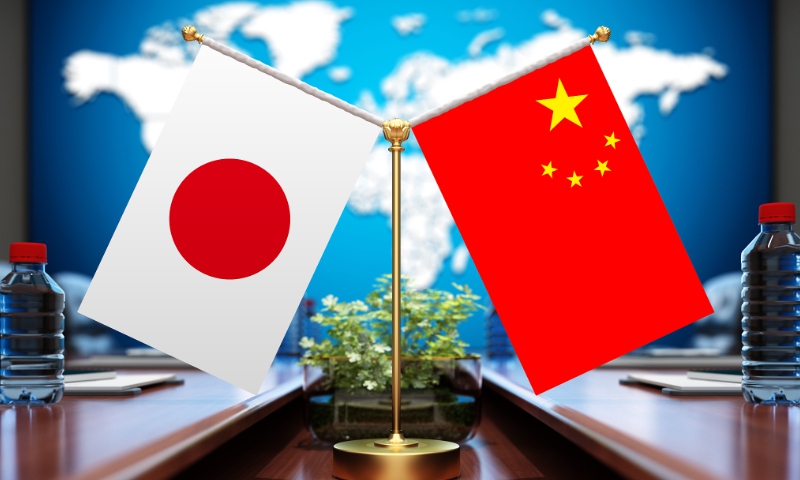
China Japan Photo: VCG
A delegation comprising of 20 senior commissioned officers from the Chinese People's Liberation Army (PLA) is reportedly embarking on a weeklong visit to Japan on Tuesday to conduct exchanges with Japanese Self-Defense Force (JSDF). Analysts said that this visit, the first of its kind in four years, reflects the mutual willingness of China and Japan to deepen defense exchanges and foster momentum to stabilize bilateral relations.
The Sasakawa Peace Foundation of Japan announced on Friday that the exchange activity between the JSDF and the PLA is taking place from Tuesday until May 20. During their stay in Japan, PLA officers are scheduled to visit the Japanese Ministry of Defense, the Komaki Air Base of Japan Air Self-Defense Force, which locate in Komaki of Aichi Prefecture and the Maizuru Naval Base of the Maritime Self-Defense Force in Maizuru of Kyoto Prefecture, Kyodo News reported.
In 2001, the Sasakawa Peace Foundation established the Japan-China Field Officer Exchange Program, which arranges annual exchange trips for officials from the JSDF and Chinese PLA to boost mutual understanding and foster dialogue, according to information from the foundation's website.
Due to the impact of COVID-19 pandemic and negative changes in Japan's policies toward China, relations between the two countries have been strained, resulting in the interruption of this program during the past years. The resumption of military exchanges between China and Japan is regarded as a positive development, contributing to the rebuilding of mutual security trust between the two countries, Xiang Haoyu, a research fellow at the China Institute of International Studies, told the Global Times on Tuesday.
It is also beneficial for strengthening crisis management, enhancing mutual understanding, exploring pragmatic cooperation and managing conflict, Xiang said.
According to the Sasakawa Peace Foundation, the program was temporarily suspended due to the deterioration of political relations. It later restarted in 2018 and officers from the two countries last met under the program in September 2019 before the pandemic.
In July 2023, JSDF officials visited Beijing. Japanese media reported that China postponed a reciprocal visit scheduled in September 2023 amid China's opposition to Japan's dumping nuclear-contaminated wastewater into the sea.
Military exchanges generally follow the principle of reciprocity, arranging delegations to visit each other's military bases, facilities and institutions to facilitate deeper understanding on each other's society and culture especially among senior commissioned officers and to benefit cooperation between the defense departments of both countries, Zhang Junshe, a Chinese military expert, told the Global Times.
Zhang also noted that senior commissioned officers are mostly young officers at the battalion, regiment and division levels who play important roles in the armed forces. Strengthening communication and understanding among young officers contributes to friendly relations between the two countries.
"Given their nature as military diplomatic activities, exchanges between senior commissioned officers of China and Japan are inevitably influenced by the political and diplomatic relations between the two countries. The recent visit of a PLA delegation of mid-level officers to Japan signifies a mutual willingness to deepen defense exchanges, foster greater mutual trust and steadfastly work toward establishing a constructive and stable China-Japan relationship that aligns with the demands of the contemporary era," Zhang said.
Starting from last year, China-Japan relations have shown signs of bottoming out and the beginnings of a gradual rebound. While negative factors affecting bilateral relations, especially Japan's dumping of nuclear-contaminated wastewater and some Japanese politicians' hyping of Taiwan question, still exist, both sides have maintained some exchanges and gradually restored relations, said Xiang.
Aside from military exchanges, there are some positive factors to encourage bilateral interactions, especially that China, Japan and South Korea are reportedly finalizing plans for a meeting of leaders in late May, the first of such trilateral meeting in more than four years, analysts said.
Broad-ranging cooperation between China and Japan, as well as between China and South Korea, can slowly unfold in various fields, said Xiang, who called for Japan as well as South Korea to work together to create positive momentum for higher-level interactions.




